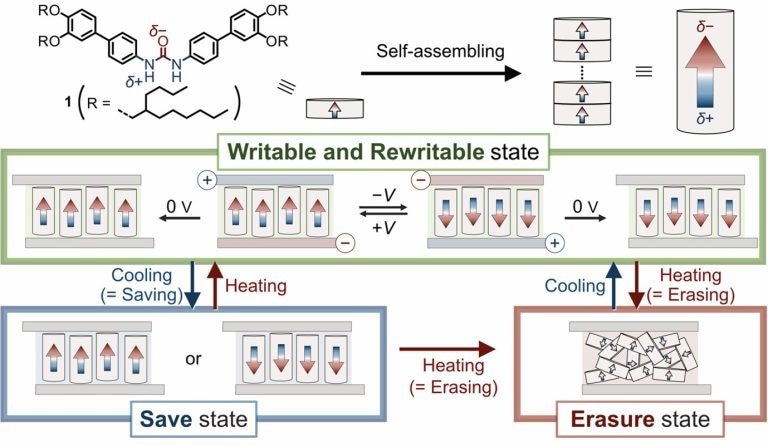A new urea-based metal-free system has been developed by researchers that has the potential to enhance data storage in devices.

Molecular structure of 1,3-bis(3’,4’-di(2-butyloctyloxy) [1,1’-biphenyl]-4-yl) urea; schematic illustration of columnar molecular aggregates; and concept illustration of writing, rewriting, saving, and erasing in the AP-FCLC system. Image Credit: Keiki Kishikawa from Chiba University
The memory storage materials available at present consist of harmful and rare metals, which lead to considerable environmental impact. Metal-free systems available for data storage utilizing liquid crystals—a beneficial alternative for environmental preservation—strive with susceptibility to external stimuli.
Now, scientists from Chiba University have come up with a novel urea-based system with long-lasting information storage potential and high tolerance towards external thermal and electric fields, thereby setting the stage for ultra-high-density memory devices.
In the present world of digital information, an immense amount of data has been exchanged and stored daily. In the 1980s, IBM revealed the first hard drive—the size of a refrigerator—that could store 1 GB of data.
However, one currently has memory devices with a thousand-fold greater data storage capacity and could easily fit in the palm of a hand.
If the present pace of increase in digital information is any indication, people need yet newer data recording systems that are lighter, consist of low environmental impact, and, most significantly, have greater data storage density.
Recently, a new class of materials known as axially polar-ferroelectric columnar liquid crystals (AP-FCLCs) has appeared as a candidate for future high-density memory storage materials.
An AP-FCLC is known as a liquid crystal with a structure of parallel columns produced by molecular self-assembly, which consists of polarization together with the column axis. The columns change their polar directions upon the application of an external electric field.
If AP-FCLCs have the potential to maintain their polarization even after the electric field is eliminated, this property, together with their metal-free composition, flexibility, power-saving ability, and low environmental impact, makes AP-FCLCs perfect for ultra-high-density memory devices.
Unluckily, as a result of the fluid nature of liquid crystals, the polarity induced by an external electric field could get easily ruined by external stimuli.
A solution to this issue has currently been suggested by a research group from Chiba University, headed by Professor Keiki Kishikawa of the Graduate School of Engineering and including Doctoral Course student Hikaru Takahashi of the Graduate School of Science and Engineering and Associate Professor Michinari Kohri of the Graduate School of Engineering.
In their recent discovery study, made available online on June 12th, 2023, and published in Volume 6, Issue 12 of ACS Applied Nano Materials on June 23rd, 2023, the team submitted a polarization fixation mechanism for a urea-based AP-FCLC system, where the materials could experience a smooth transition from AP-FCLC phase to a crystal (Cr) phase without impacting the induced polar structure.
The goal was to realize a compound with three states: a writable and rewritable state, an erasure state, and a save state. Emphasis was placed on minimizing the change in molecular packing structures during the FCLC−Cr phase transition process.
Keiki Kishikawa, Professor, Graduate School of Engineering, Chiba University
For a polarization-fixable AP-FCLC system to be created, the research group synthesized 1,3-bis (3’,4’-di (2-butyloctyloxy) [1,1’-biphenyl]-4-yl) urea—an organic molecule comprising urea at its molecular center for producing a hydrogen bonding network that could streamline the formation of columnar aggregate present in a liquid crystal (LC) state.
Two biphenyl groups as substituents for producing powerful intermolecular interactions in the column structure and four huge alkyl groups as terminal chains to avoid tight molecular packing and allow lower-temperature FCLC−Cr phase transition.
The prepared FCLC system displayed preservation of polarization in the Cr phase, with resistance and thermally stable polarization information storage to the external electrical field at room temperature.
Moreover, it was discovered that the molecules self-sorted into nanosized helical columns, which further developed small domains and turned out to be ferroelectric.
This study offers a new plan for the development of AP-FCLC systems that have the potential to retain their polarization information for a long time. The suggested framework could be utilized to come up with stable memory materials with high tolerance towards low environmental impact and external stimuli.
AP-FCLCs have the potential to achieve more than 10,000 times larger recording density than Blu-ray Discs, but they have not been put into practical use due to the instability issue. This work will help improve their reliability, paving the way for light-weight flexible electronic devices and incinerable confidential information-recording devices.
Keiki Kishikawa, Professor, Graduate School of Engineering, Chiba University
Journal Reference
Takahashi, H., et al. (2023) Axially Polar-Ferroelectric Columnar Liquid Crystalline System That Maintains Polarization upon Switching to the Crystalline Phase: Implications for Maintaining Long-Term Polarization Information. ACS Applied Nano Materials. doi.org/10.1021/acsanm.3c01508.